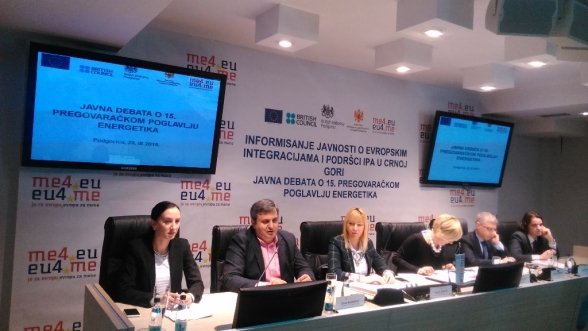Today, Chairperson of the Committee on European Integration Mr Slaven Radunović participated as a panellist in the public debate dedicated to the content of the Chapter 15 – Energy, organised by the Minister of Foreign Affairs and European Integration, in cooperation with the EU Delegation and the British Council in Montenegro.
The public debate was marked by discussion on harmonising national regulations with the European Standards in the field of energy, through defining adequate legal framework and practical implementation. Cooperation between Montenegro and the European Union in the energy policy was initially defined through Stabilisation and Association Agreement, and as a candidate country for EU membership and a member of Energy Community, Montenegro committed to implementation of the EU acquis in this field. Additionally, it is expected that by adopting the laws and secondary legislation by the end of the year, Montenegro would perform complete transposing of the Third Energy Package.
Chairperson of the Committee on European Integration Mr Slaven Radunović said that a cheaper and more productive energy alternative for Montenegro could be increasing energy efficiency, with practically limitless possibilities. He added that energy rationalisation could significantly contribute to stimulating innovation, employment and economic growth, and with a better choice of energy efficient technologies, better organisation and improvement of quality, significant energy and financial savings could be achieved. However, according to him, stable regulatory market environment needed to be provided, representing a prerequisite for attracting investment in the energy sector, as well as providing a greater degree of security in energy supply. In addition, the importance of ecological environment, optimal use of existing capacities of transport and production, as well as providing support for improvement and reconstruction of infrastructure needed to be added to development of market competition, concluded Mr Radunović.
The participants agreed that the legislative framework that fitted the view of the European Union in this field would contribute to promotion of investment climate, in order for Montenegro to provide quality and sustainable investments in this sector.
At the gathering, in addition to the Chairperson of the Committee, the following also spoke on the content of the Chapter: Ms Angelina Živković, Negotiator for Chapter 15 and acting Director General for State Roads at the Ministry of Transport and Maritime Affairs; Ms Dragica Sekulić, Assistant Minister of Economy and Head of Working Group for Chapter 15; Mr Alberto Cammarata, Head of Political Section at the EU Delegation, and Mr Lyndon Radnedge, Deputy Head of Mission at British Embassy to Montenegro.









